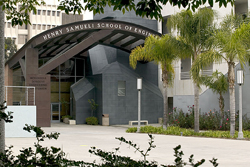Spring 2009 Samueli School Fellowship Roll-Call
Engineering students earn numerous prestigious fellowship awards
 The Henry Samueli School of Engineering is pleased to recognize graduate students who have been awarded fellowships in recognition of their outstanding research and academic accomplishments.
The Henry Samueli School of Engineering is pleased to recognize graduate students who have been awarded fellowships in recognition of their outstanding research and academic accomplishments.Four Samueli School Ph.D. graduate students were awarded the Graduate Dean's Dissertation Quarter Fellowship: Jessica Ayers and Angela Y. Chen of biomedical engineering, and Laura Marchal-Crespo and Sadegh Dabiri of mechanical and aerospace engineering. The Dissertation Quarter Fellowship supports students who are nearing the filing stage of their dissertation.
Seventh-year Ph.D. student Jessica A. Ayers, under the advisement of Professors William C. Tang, Ph.D., and Zhongping Chen, Ph.D., has completed the design for the fabrication of a piston-like Micro-Electro-Mechanical System (MEMS) for use in the tip of a catheter used in biomedical endoscopy. The MEMS device is a micro-actuator system for the precise transmission and reception of bio-optical signals, which is beneficial for obtaining 3-D optical coherence tomography images. These images are comparable to histology, and can serve as an "optical biopsy," with no surgery required.
Angela Y. Chen, a fifth-year doctoral student in the laboratory of Associate Professor James P. Brody, Ph.D., is researching the single-molecule kinetics of the enzyme chymotrypsin using a microfabricated array of cylindrical wells and fluorescence microscopy to detect enzyme activity. Chymotrypsin is a simple protease, which she is using a proxy to study proteasomes. A proteasome is a multi-protein complex that regulates the destruction of proteins within a cell, and is likely to play a role in diseases like cancer and Alzheimer’s. Further analyzing this cell component could reveal the mechanism of action of its subunits.
Sadegh Dabiri, a fourth-year Ph.D. student in the laboratory of William A. Sirignano, Ph.D., The Henry Samueli Endowed Chair in Engineering and professor of mechanical and aerospace engineering, is currently investigating the effects of cavitation – a phase change in liquids caused by pressure reduction – on high-pressure liquid atomization. This phenomenon is favorable to improving the characteristics of the spray generated by liquid injectors. Liquid atomizers have many applications, including fuel injectors from diesel to liquid propellant rocket engines.
Laura Marchal-Crespo studied autonomous vehicles, computer vision, haptic devices (which interface with a user through the sense of touch) and motor behavior for the design and control of a pediatric smart wheelchair for training children with disabilities to drive a power wheelchair. This new rehabilitation technology will use an intelligent robotic joystick and a computer vision system to guide a disabled child in learning how to navigate a wheelchair safely in a controlled clinical environment. Marchal-Crespo, who is advised by Professor David Reinkensmeyer, Ph.D., also received a $1,000 Public Impact Honorable Mention Fellowship in recognition of her research.
Mary Amasia, who was recently featured for her research in developing a rapid-response anthrax detection system, was awarded a $10,000 Public Impact Fellowship, which recognizes doctoral students whose research will have important societal value and will significantly benefit the local, national or global community. The Public Impact Honorable Mention Fellowship was also awarded to Xavier Casadevall i Solvas, Laura Marchal-Crespo, and Shane Stephens-Romero.
Recent chemical and biochemical engineering Ph.D. graduate Xavier Casadevall i Solvas conducted research in developing and testing microfabricated polymer actuators for BioMEMS applications in the lab of Chancellor’s Professor Marc Madou, Ph.D. These actuators – mechanical devices for moving or controlling a mechanism or system – can be used to protect implanted biosensors, with applications in continuous and reliable long-term glucose monitoring systems for people with diabetes.
Shane Stephens-Romero, a fourth-year environmental engineering graduate student under the advisement of Professor Scott Samuelsen, Ph.D., studies hydrogen as a transportation fuel in the Advanced Power and Energy Program at UC Irvine. He is currently assessing the impacts of hydrogen as an alternative fuel and the development of a hydrogen production and distribution infrastructure to implement new transportation methods like hydrogen fuel cell vehicles.
Carolina Soto-Quintero, a fourth-year electrical engineering and computer science doctoral student, was recently awarded the Miguel Velez Fellowships from the UCI Graduate Division. The Velez Fellowship provides support to students who are citizens and residents from a Latin American country, and who demonstrate outstanding past academic achievement and future promise. Soto-Quintero conducts research on a state-of-the-art hyperspectral image processing application for use in the analysis of temperature fluctuations in human studies, which may be used in medical applications. She plans to complete her studies at UC Irvine and return to her native Colombia to pursue a teaching and research career.
